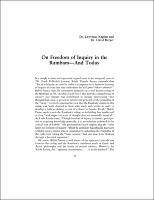Please use this identifier to cite or link to this item:
https://hdl.handle.net/20.500.12202/9294Full metadata record
| DC Field | Value | Language |
|---|---|---|
| dc.contributor.author | Kaplan, Lawrence | - |
| dc.contributor.author | Berger, David | - |
| dc.date.accessioned | 2023-10-10T21:05:31Z | - |
| dc.date.available | 2023-10-10T21:05:31Z | - |
| dc.date.issued | 1990 | - |
| dc.identifier.citation | Kaplan, L., & Berger, D. (1990). On freedom of inquiry in the Rambam – and today. Torah u-Madda Journal, 2, 37-50. | en_US |
| dc.identifier.issn | Publisher Information: | - |
| dc.identifier.uri | https://www.academia.edu/44322705/Lawrence_Kaplan_and_David_Berger_On_Freedom_of_Inquiry_in_the_Rambam_and_Today_Torah_u_Madda_Journal_vol_2_1990_37_50 | en_US |
| dc.identifier.uri | https://hdl.handle.net/20.500.12202/9294 | - |
| dc.description | Scholarly article | en_US |
| dc.description.abstract | In a crisply written and vigorously argued essay in the inaugural issue of The Torah U-Madda Journal, Rabbi Yehuda Parnes contends that "Torah u-Madda can only be viable if it imposes strict limits on freedom of inquiry in areas that may undermine the yod gimel 'ikkarei emunah." Rabbi Parnes bases his contention primarily on a well known ruling of the Rambam in Hil. 'Avodah Zarah 11:2-3 that forbids reading books of idolatry and extends that prohibition to include entertaining "any thought that causes a person to uproot any principle of the principles of the Torah." Correctly rejecting the view that the Rambam's intent in this ruling was "only directed at those who study such works in order to develop a faith in idolatry or out of a desire to forsake Torah," Rabbi Parnes understands the Rambam's ruling as forbidding free intellectual activity "with respect to areas of thought that are essentially heretical." As Rabbi Parnes notes, "Though freedom of inquiry is almost a prerequisite to acquiring knowledge generally, it is nevertheless eschewed in the critical area of kefirah." His presentation clearly implies that the "strict limits on freedom of inquiry" which he considers halakhically necessary prohibit even a person who is committed to upholding the principles of the faith from risking the "inner tension" that can arise from thinking through a heretical argument. 1 (from Introduction) | en_US |
| dc.language.iso | en_US | en_US |
| dc.publisher | Max Stern Division Communal Services | en_US |
| dc.relation.ispartofseries | Bernard Revel Faculty Publications;1990 | - |
| dc.rights | Attribution-NonCommercial-NoDerivs 3.0 United States | * |
| dc.rights.uri | http://creativecommons.org/licenses/by-nc-nd/3.0/us/ | * |
| dc.subject | freedom of inquiry | en_US |
| dc.subject | yod gimel 'ikkarei emuna | en_US |
| dc.subject | Maimonides, Moses, 1135-1204. 13 ʻiḳre ha-emunah. | en_US |
| dc.subject | Rabbi Yehuda Parnes | en_US |
| dc.subject | Jewish principles of faith | en_US |
| dc.subject | Jewish belief | en_US |
| dc.title | Lawrence Kaplan and David Berger, “On Freedom of Inquiry in the Rambam – and Today,” Torah u-Madda Journal, vol. 2 (1990): 37-50 | en_US |
| dc.type | Article | en_US |
| Appears in Collections: | Bernard Revel Graduate School of Jewish Studies (BRGS): Faculty Publications | |
Files in This Item:
| File | Description | Size | Format | |
|---|---|---|---|---|
| Lawrence_Kaplan_and_David_Berger_On_Freedom 37-50 1990.pdf | 2.02 MB | Adobe PDF |  View/Open |
This item is licensed under a Creative Commons License

